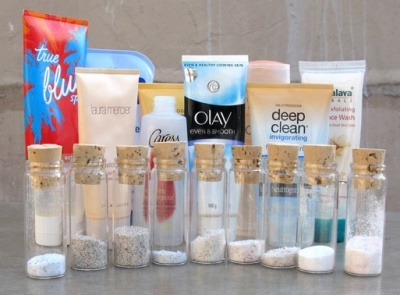UK could finally ban polluting microbeads from cosmetics, following US’s lead
Action to finally end the use of polluting plastic microbeads in cosmetics in the UK took a step closer yesterday (14 June), as a minister from the Department of Environment, Food & Rural Affairs (Defra) said that the UK government now supports a ban on the use of microbeads in the UK.
Defra MP George Eustice told the Environmental Audit Committee (EAC), the cross-party group that monitors government’s policies on the environment, that, now that the US has banned polluting plastic microbeads from cosmetics, the UK is prepared to follow suit.
The announcement follows quite a bit of recent activity from the EAC concerning microbeads and the wider issue of microplastics: in March, it launched an inquiry into the damaging effects of microplastics, which most often result from the degradation of larger fragments of plastics in the sea, but are also manufactured as microbeads for use in products such as toothpastes, cleaning products and exfoliants. Last week, the committee released a briefing, ‘Marine microplastic pollution’, with EAC chair, Mary Creagh MP, saying that a ban on cosmetics should be sought if companies do not take action themselves.
Ban could ‘catch’ non-compliant companies

Responding to an EAC question on the government’s current position, he said: “In particular, since a decision in the US to introduce a ban itself, we’ve made clear that we support a ban on microbeads in cosmetics, and that we are working with other EU countries to basically get that on the agenda at a European level, but we don’t rule out doing it at a national level if that falls short or fails to progress.”
The minister defended the progress made by voluntary commitments, saying that “most of the cosmetic companies have signed up to say that they do want to phase these things out anyway”, but added: “Once you get to that point, quite often the easiest thing to do is to simply put a ban in place, so that if there are any remaining companies that are refusing to sign up to the ban, they’re caught by it.”
Action required at EU level
A national ban, however, might not prevent microbeads from being sold in the UK, with MPs suggesting action needs to be taken at an EU level.
Creagh asked if going through the EU is the only way the ban would work because of Europe’s contiguous waters, and Eustice, who backs a Brexit in the upcoming referendum, responded: “While we are in the single market… you wouldn’t have the power to introduce a ban on their sale. What we could do nationally if we wanted to was to introduce a national ban on using microbeads in manufacturing within our territory, within the UK. But our view is that it would be better to try and progress this at a European level and to get other countries to do the same.”
Eustice did not have any figures about how much cosmetic manufacturing takes place in the UK, and hence how effective a national ban would be, but added that there was “widespread support from EU member states”, including the Netherlands, France, Belgium and Austria. He added: “If things go well, it is quite possible you could have a ban in place during 2017.” Despite this, though, there would be a transitional period, with manufacturing of microbeads ending about 18 months after the law was passed and sales shortly after that, meaning products containing microbeads could be on our shelves for some time yet.
Preventing microplastic pollution
Waste water treatment plants are not designed to filter microplastics, and the technology does not exist to remove them from the ocean, so it is generally agreed that the most effective way of reducing microplastic contamination is to stop plastics reaching the ocean in the first place.
So far, at least 25 countries have implemented national policies to decrease or ban the usage of microbeads in cosmetic products, including Canada and the USA, which introduced the Microbead Free Waters Act in December 2015.
Most microplastic pollution, however, results from the breakdown of larger bits of plastic, 12.2 million tonnes of which enters the marine environment every year. Microplastic litter is a particular concern because scientist have discovered it ingested by creatures throughout the food web.
Research is just beginning to determine the impact this has on the animals that ingest it, as well as how far up the food chain it travels, but early studies show that eating plastics can have a damaging effect on a fish’s health and chances of survival.
More information is available in our feature article, ‘Plastic Soup’ from Resource 84.






